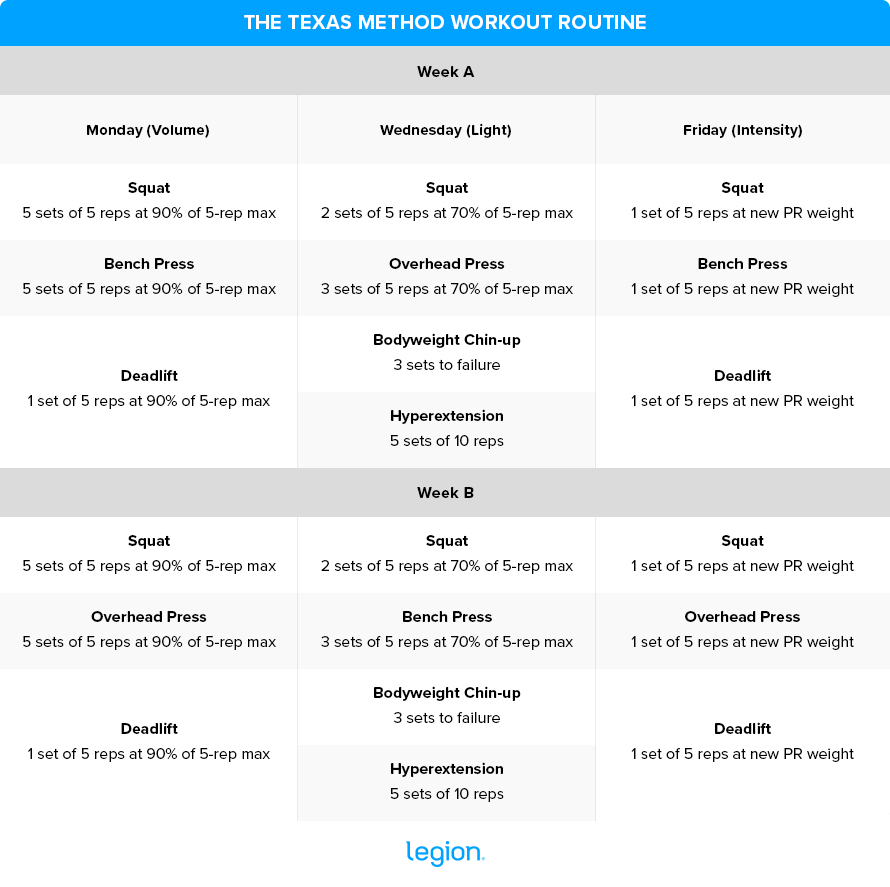The Texas Method is a strength training program created by Glenn Pendlay and Mark Rippetoe.
It’s a favorite routine for those who’ve stopped seeing results from beginner programs and need a more advanced routine to continue progressing
In this article, you’ll learn what the Texas Method is, as well as everything you need to know about following the Texas Method program, including the workout routine, how to schedule your training, the exercises, rest times, progression scheme involved, and more.
What Is the Texas Method?
The Texas Method is a weightlifting program created somewhat by accident by the well-known Olympic weightlifting coach, Glenn Pendlay, and the creator of Starting Strength, Mark Rippetoe.
They designed the Texas Method lifting routine for athletes who found doing 5 sets of 5 reps of squats on Fridays too exhausting. Instead, the athletes could skip the 5×5, provided they attempted a new 5-rep max.
Over time, the coaches noticed that the athletes doing this simpler routine outperformed those sticking to 5 sets of 5 reps in every workout. And with that, the Texas Method was born.
The “method” is essentially a flexible training framework rather than a strict strength program.
It’s perfect for those who have maxed out their gains from beginner programs because it slows the rate of progression, which is vital if you want to continue gaining strength after your first 6-to-12 months of training.
What sets the Texas Method apart from many strength training programs is its use of daily undulating periodization. This approach alters the volume and intensity of workouts throughout the week to help you avoid progress plateaus.
A Complete Guide to the Texas Method Program
Here’s everything you need to know about the Texas Method program.
The Texas Method Lifting Routine
You do 3 workouts per week on The Texas Method.
Mondays are “Volume Days,” where you lift moderately heavy weights for sets of 5 reps.
Wednesdays are “Light Days,” where you do fewer sets of 5 reps with lighter weights.
Fridays are “Intensity Days,” where you aim for 1 set of 5 reps at your maximum effort, with the goal of setting a new personal record (PR)
Here’s an example of a well-rounded Texas Method workout routine that many people follow:

You alternate between weeks A and B, which allows you to try for new personal records on both your bench press and overhead press regularly.
Volume and Light Days are straightforward: you start with a warm-up (more on the specifics soon), then do your planned sets and reps.
On Fridays, your goal is to lift the most weight you can. Begin with a warm-up, then attempt a new 5-rep PR, aiming for 5-to-10 pounds more than your last 5-rep max.
For instance, if your best 5-rep squat is 275 pounds, on Friday, you would try for 280 or 285 pounds.
The Texas Method Schedule
Most people default to the following schedule:
- Monday: Volume
- Tuesday: Rest
- Wednesday: Light
- Thursday: Rest
- Friday: Intensity
- Saturday: Rest
- Sunday: Rest
That said, you can be flexible if training on Mondays, Wednesdays, and Fridays doesn’t suit your schedule. The only thing to remember is that you must leave at least one day to recover between workouts.
The Texas Method Exercises
Because there’s no set routine for the Texas Method, the exercises can vary depending on the aim of the program. In most cases, however, the exercises in the Texas Method program are:
How Long to Rest Between Sets in a Texas Method Workout
Rest 2-to-5 minutes between sets or until you feel ready to give the next set your best effort.
How to Warm Up in a Texas Method Workout
Start with an empty bar for 2 sets of 5 reps.
Increase the weight gradually over a few more sets until you reach your target weight.
For a 275-pound squat in a Friday workout, your warm-up could look like this:
- Empty Bar (45 pounds): 2 sets of 5 reps
- 135 Pounds: 2 sets of 5 reps
- 185 Pounds: 1 set of 3 reps
- 235 Pounds: 1 set of 2 reps
- 275 Pounds (Your working sets): Try for your new 5-rep max
How to Progress on the Texas Method Program
The main idea of the Texas Method lifting routine is to make progress every week.
To do this, add 5 pounds to your single set of 5 reps every Friday. You’ll use this new 5-rep max to determine what weights to use on Monday and Wednesday. Then, the next Friday, you try for a new PR again. This linear progression ensures the weights you lift in each workout increase over time.
If Monday’s workout is too hard (meaning you can’t complete all your reps with good form), it’s a sign you need to reduce your workload. A good place to start is doing 3 sets of 5 reps at 90% of your 5-rep max for squats and bench presses, or lower the weight to 80% of your 5-rep max. The key here is allowing your body more time to recover.
If you’re okay on Monday but can’t hit new PRs on Friday, you might need to change your Monday workout by increasing the volume (how many reps you do) or the intensity (how heavy the weights are).
For increasing volume, for example, instead of 5 sets of 5 reps at 90% of your 5-rep max, try doing 5 sets of 8 reps at 80%.
To increase the load while keeping your total number of reps about the same, you might do 8 sets of 3 reps (totaling 24 reps) with 95% of your 5 rep max instead of your usual 5 sets of 5 reps.
The Texas Method Program FAQs
FAQ #1: What is the Texas method?
The Texas Method is a strength training program co-developed by Glenn Pendlay and Mark Rippetoe. The 3-day program primarily includes compound exercises and adjusts training volume and intensity across the week to help you continue making progress once you’ve outgrown beginner programs.
FAQ #2: Does the Texas method work?
Yes, the Texas Method works well for intermediate weightlifters who have hit a plateau with their current routines. Varying volume and intensity across the week helps you break through plateaus and continue making strength and muscle gains.
FAQ #3: Is the Texas Method good for beginners?
The Texas Method is best suited for those who have already built a foundation of strength and are no longer making gains with beginner programs. It’s designed for weightlifters who need a more sophisticated program to continue progressing, making it less ideal for those new to weightlifting.








